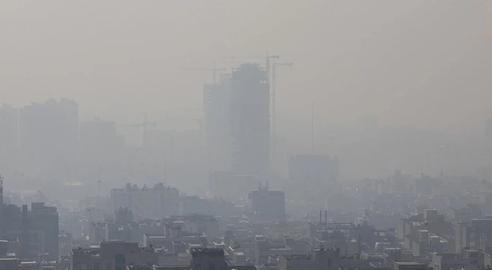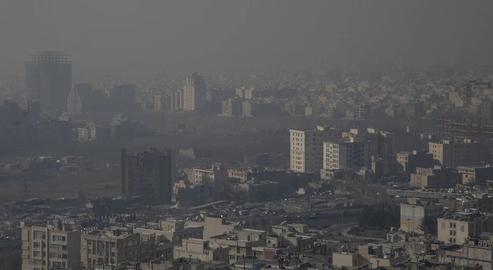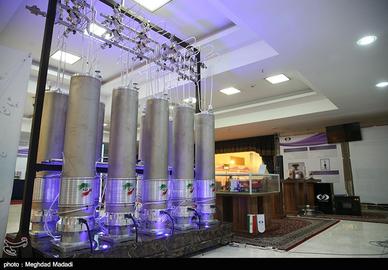Deteriorating air quality in Tehran has recently been making headlines. Recently, on some days the level of contaminants in the air was so high it was declared dangerous for some vulnerable members of the population to leave their homes. Some scientists believe bad air quality can also impact on people’s ability to recover from Covid-19, which can cause respiratory complications.
Many citizens in Tehran, however, have no choice but to brave the smog. In this report, IranWire’s citizen journalist Venus Omidvar speaks to a series of taxi drivers in Tehran, who are among the worst-exposed to air pollution and the risk of disease.
***
Hashem has red-rimmed eyes that well up continuously as he speaks, reflected in the front mirror of the cab. Addressing the two passengers in the back seat, he says, "You see my eyes? They burn, badly. On days like this, when the air pollution is rampant, this is my situation."
Deteriorating air quality in Tehran, which officials claim has been caused by the burning of low-quality mazut fuel, is endangered the health of people in the capital – chief among them those forced to go outside for work. Hashem is 60 years old and has a heart condition, and ideally would not be going outside at all. “If I stop working even for two days,” he says, “I’ll be two weeks behind on living expenses.”
He coughs from time to time, and goes on: "Coronavirus has upped the cost of living for me. Because of my job, I have contact with a lot of different people. As a result, six months ago, first I and then my wife came down with Covid-19 and got very sick.
“Over the three weeks we were suffering from this disease, we spent about 10 million tomans on doctors, medication and treatment, and because of physical weakness I then couldn’t work for two months.
“You see how far I have fallen behind in life. Now, I have to drive in the streets from 7am to 9pm in the extremely toxic air, with two masks on my face – and it’s really hard for me to breathe – to make up for the past few months."
This taxi driver lays the blame for his problems squarely on the authorities. “Look at this air,” he says. “You can’t see anything but darkness. Elsewhere in the world, offices, companies and even markets might be closed for a few days to reduce traffic and bring the situation back to normal. But in our country, because the officials’ hands are in the pockets of the people, by closing the country for a few days their share of the income would be reduced so they’re not willing to shut down Tehran for so much as two days.”
According to the Tehran Air Quality Control Company, mean levels of pollutant particles in the air in recent days have been so high that no-one in the population is not at risk. Tehran emergency department has been put on standby to receive new patients as a result and visits to emergency centers have already increased by 10 percent.
Abbas Shahsavani, head of the Ministry of Health's climate change division, has predicted that air pollution will lead to a 15 percent increase in infections and deaths from Covid-19 in Tehran. And yet lessons from the pandemic do not appear to have been learned, and people are being forced to continue as normal.
Mojtaba, a driver with an online minicab firm, says employed taxi drivers are most at risk from air pollution because "managers have to instruct the drivers to observe [Covid-19] health protocols. We have to open the car windows when transporting a passenger to improve the airflow. But on the other hand, we’re on the streets for 15 hours a day in this pollution. It makes it really difficult for you to breathe.”
He adds: "If you look closely, drivers are driving more aggressively these days than before. This air really saps your patience and energy. You constantly feel tired and the slightest disturbance, like the sound of a car horn or somebody’s bad driving – which is very common in our country – drives you crazy. This means you get involved in more altercations and fights, until you come to your senses again."
Passing through the Tohid Tunnel, Mojtaba points out the continuous sounding of car horns from surrounding drivers. “Note the air in this tunnel,” he says. “It’s full of cars and the traffic is thickening every moment. Now think about how many hours a day you might have to travel on this route [as a driver]; does it leave you with any nerves at all?
“Believe me, I go home every night with nausea, headaches, burning eyes and shortness of breath, and in the morning I don’t want to leave the house at all. But I have no choice but to do this gig to feed the four people in my family."
The government has claimed the burning of cheap, low-quality mazut fuel, used in the furnaces of power plants as well as diesel engines, is behind the spike in contaminants in the air. Iran’s Minister of Petroleum, Bijan Zanganeh, has said the state has “no other choice” than to allow it to continue.
Isa Kalantari, head of the Department of the Environment, has claimed the burning of mazut has quadrupled in recent years because it cannot be exported to other countries due to sanctions. In principle, he says, “Mazut must be refined for use. But the Ministry of Energy does not do this. They say it would require millions of dollars of investment which is difficult to achieve under sanctions."
This article was written by a citizen journalist in Tehran under a pseudonym.
Related coverage:
Officials Warn Air Pollution Could Make People More Vulnerable to Covid-19
Air Pollution Could Mean New Spike in Covid Cases
visit the accountability section
In this section of Iran Wire, you can contact the officials and launch your campaign for various problems



























comments